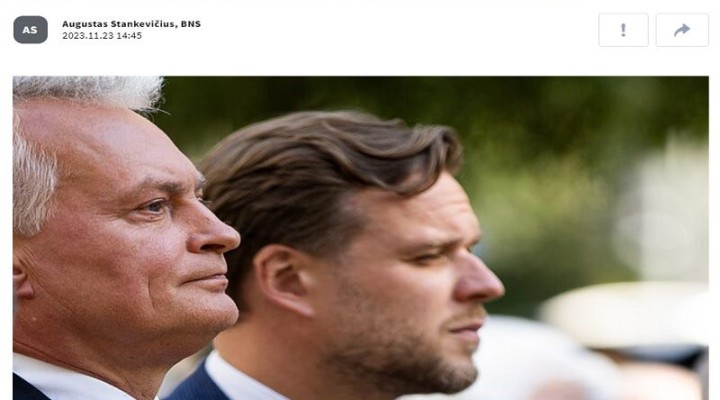The Lithuanian Elite Is Splitting Into Ideologues & Pragmatists On Russia

If this country’s elite is splitting into ideologues and pragmatists on Russia despite their infamous reputation as Russophobes, then it should be taken for granted that the entire West’s is splitting too, the trend of which is expected to accelerate as the conflict continues winding down.
Lithuania is known to be one of the most Russophobic countries on the planet, which is why it was so surprising that President Gitanas Nauseda just slapped down Foreign Minister Gabrielius Landsbergis for fearmongering that freezing NATO’s proxy war on Russia through Ukraine could lead to war in Europe. That country’s top diplomat predicted that Russia would attack in a few years should that happen, which prompted its president to react by demanding that he “sit down and calm down.”
“NATO’s Proxy War On Russia Through Ukraine Appears To Be Winding Down” for the reasons contained in the preceding hyperlinked analysis, with even Bloomberg noting in its detailed article from Friday that the West has seen the writing on the wall and has begun pressuring Ukraine to consider a compromise. The problem is that some Western elite have been radicalized throughout the course of this nearly decade-long conflict’s latest phase and have thus attempted to stop that from happening.
Those like Landsbergis can’t countenance even an armistice, let alone a formal peace, for ideological reasons since that outcome would contradict their Russophobic worldview. In their minds, only fools trust Russia, which is supposedly always pining to invade its neighbors and will never lose this imperial lust. It would therefore amount to an unprecedented post-Old Cold War victory for Russia in their minds for Kiev to recommence peace talks in compliance with the West’s reported pressure as of late.
By contrast, while the entirety of the Lithuanian elite and most of the Western one in general nowadays is indisputably Russophobic, there still exist some comparatively more pragmatic figures who accept that the West lost the “race of logistics”/“war of attrition” to Russia and must now compromise with it. Considering how increasingly difficult it’s becoming to maintain the pace, scale, and scope of armed aid to Ukraine, freezing the conflict is deemed the “lesser evil” to risking a potential Russian breakthrough.
In the event that Russia smashes through the Line of Contact and steamrolls as far and fast as it can behind the front, then there’s a credible chance that the US would panic by authorizing a conventional (perhaps Polish-led) NATO intervention aimed at drawing a line in the sand as far east as possible. That would dramatically raise the risk of World War III by miscalculation, hence why only the most irredeemably radicalized ideologues like Landsbergis aren’t scared of that scenario.
To the contrary, he and his ilk across that New Cold War bloc have convinced themselves that Russia is extremely weak, will certainly back down under such direct military pressure, and would easily be destroyed by NATO if it doesn’t. The Russophobic worldview that was just described isn’t shared by the most influential members of the Western elite, even if it remains unclear what ratio of them in general agree with its precepts, as proven by that having not yet happened despite their repeated pleadings.
The comparative pragmatists among them had hitherto been reluctant to publicly express their more realistic views on this matter even though their most influential figures were formulating policy according to it since they feared that their ideological rivals would get the media to “cancel” them. At the very least, they’d be smeared as so-called “Russian agents”, “defeatists”, and/or “appeasers”, which could have forced their resignations under duress and thus ruined their lives.
The failure of Ukraine’s over-hyped and ultra-expensive counteroffensive revolutionized the Western discourse about this proxy war, however, as it’s now no longer taboo to talk about “face-saving” exit strategies from that conflict. In fact, it’s actually the latest narrative trend for the reasons that were earlier explained, which makes sense from the Western elite’s interests as a whole since fear that their class will be discredited in the public’s eyes if expectations about the endgame aren’t soon tempered.
They see the writing on the wall and know that Ukraine’s hoped-for maximalist victory over Russia is impossible to attain, yet freezing the proxy war without first tempering the public’s expectations could result in the radicalized masses turning against their elite on the pretext that they “sold out” to Russia. Ideologues like Landsbergis don’t realize it, but pushing their radical Russophobic worldview at this pivotal juncture in the proxy war discredits his class as a whole and is therefore counterproductive.
These calculations explain why the president had no choice but to slap down his top diplomat after the latter’s latest fearmongering, which set a powerful example for all their Western counterparts considering Lithuania’s infamous reputation for Russophobia. If this country’s elite is splitting into ideologues and pragmatists on Russia, then it should be taken for granted that the entire West’s is splitting too, the trend of which is expected to accelerate as the conflict continues winding down.
https://korybko.substack.com/p/the-lithuanian-elite-is-splitting
 TheAltWorld
TheAltWorld 
0 thoughts on “The Lithuanian Elite Is Splitting Into Ideologues & Pragmatists On Russia”